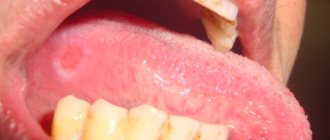Everyone has had to deal with unpleasant sensations in the mouth, but not with a burning sensation. This symptom is not very common, which is why it takes many people by surprise. The patient is not entirely clear what to do and who to contact.
There are several causes of burning in the mouth and tongue
, and in order to correctly prescribe treatment, the specialist will first have to go through all possible options, prescribe a comprehensive diagnosis and identify the disease that provoked such symptoms.
Burning in the mouth and tongue: what can cause it and how to treat it
When a burning tongue occurs after drinking something spicy or alcoholic, this is a normal phenomenon that goes away on its own. If a symptom bothers a person for no apparent reason, appears frequently, is accompanied by other unusual sensations and a disturbance in well-being, it is necessary to consult a doctor. This situation may indicate the development of a pathological process in the body. What disease can cause a burning sensation in the mouth, how to relieve it and much more - read further in the article.
What can cause a burning sensation in the mouth and tongue?
Diagnosis of glossalgia
These sensations can appear at any time of the day, often intensify in the evening, and rarely occur at night. These manifestations may be for no apparent reason, or may occur or intensify after irritating food, the burning sensation may completely disappear while eating non-irritating food. This is an important diagnostic sign of the syndrome.
Burning sensations may be accompanied by swelling of the tongue with tooth marks along its edges, small cracks in the tongue, mild soreness of the tongue and taste disturbances often occur.
Patients may have neuropsychiatric disorders: disorders of the autonomic nervous system in the form of increased heart rate (tachycardia), sweating, pale skin, increased tendon reflexes, obsessive-compulsive neurosis, depression, etc.
The patient is advised to consult specialists: dentist, neurologist, gastroenterologist to exclude glossitis (inflammation of the tongue caused by infection, chemical irritant, injury to the tongue, allergies) and B12 and folic anemia, which causes burning and pain of the tongue with its characteristic changes: bright red, smooth and a shiny (varnished) tongue.
Why does my tongue and mouth burn?
Before treating a burning sensation of the tongue and mouth, it is necessary to determine the cause of this syndrome. Pathology can be caused by a huge number of factors, often several at once. Conventionally, they can be divided into several groups - the most common of them are presented below.
Oral diseases
Oral diseases in adults and children often lead to this problem.
- candidiasis: decreased immunity causes active proliferation of the Candida fungus, which affects not only the mucous membranes of the cheeks, gums and palate, but also the tongue. A characteristic coating appears on it - in the form of cottage cheese. Sometimes there is no plaque (with the atrophic type of the disease), but the burning sensation under and around the tongue remains,
This is what a fungal infection on the tongue looks like - Xerostomia: manifested by insufficient moisture of the mucous membrane, cracks on the surface of the tongue, lips, cheeks. A particularly strong burning sensation on the tongue with xerostomia occurs when consuming acidic foods,
- diseases of the tongue: of the numerous pathologies of the organ, the most common cause of constant burning is desquamative glossitis and folded tongue,
- herpes: stomatitis in the herpetic form causes the appearance of blisters and erosions in the mouth, leading to severe tingling and pain.
Herpes on the mucous membrane is a very unpleasant phenomenon - Leukoplakia: in addition to the blurry grayish-white spots on the mucous membrane characteristic of this disease, its symptom may also be a burning sensation (especially in the presence of erosions),
- lichen planus: as in the previous case, tingling on the tongue is especially pronounced when erosions form.
Lichen planus in the mouth can cause a burning sensation
Dental problems
Pathological dental conditions, untimely or incorrect treatment, prosthetics and other situations can also cause an unpleasant illness:
- tartar: being a focus for the accumulation of pathogenic microbes, deposits on the teeth can cause sluggish inflammatory processes in the mucous membrane of the tongue, especially its tip (directly in contact with the surface of the teeth),
- dentures: a burning sensation in the mouth and tongue can be caused by unsuitable dentures, low-quality structures or their prolonged use (provokes the development of fungal infection, bacteria - so-called denture stomatitis),
The cause of burning may be rubbing the mucous membrane with a denture. - Bruxism: Grinding your teeth while you sleep can accidentally damage the lining of your tongue, causing it to burn when you eat.
Allergy
A burning sensation in the mouth and lips may be associated with an allergic reaction of the body. In most cases, allergy symptoms appear after the installation of a prosthesis due to the use of low-quality material, a violation of the construction technology, incorrect parameters, and so on. You can check whether the tingling of the mucous membrane is an allergy or not by removing the product for several days (if it is removable) or taking antihistamines. In addition to dentures, food, toothpaste or mouthwash, drinks, foods, etc. can be allergens.
This is what a denture allergy looks like
Diseases of the digestive tract
The mucous membrane of the oral cavity is the initial section of the mucous membrane of the digestive tract, so any disturbances in the functioning of the gastrointestinal tract will necessarily affect its condition. For example, pain and tingling of the tongue - one of the signs of atrophic inflammation of the mucous membrane - can be a consequence of gastritis or colitis. A peptic ulcer causes bitterness in the mouth, burning of the tongue, and pain.
Endocrine disorders
Before getting rid of a burning sensation in the mouth, it is necessary to check the condition of the endocrine system. An unpleasant symptom can be triggered by changes in hormonal levels: diabetes, pregnancy, menopause and other conditions lead not only to tingling, but also to itching.
“According to the observations of specialists, men are less likely to go to the doctor with a complaint of a burning sensation in the mouth. This is due to the peculiarities of the female endocrine system. Fluctuations in their hormonal levels occur almost constantly: before, after and during menstruation, during pregnancy and after childbirth, before menopause, during menopause. If we add to this stress, malnutrition, any diseases and other factors, then it is not surprising that this symptom is seven times more likely to bother the fair half,” says expert, endocrinologist Yulia Samoiskaya.
General health problems
In addition to those listed, there are many other reasons for a burning tongue:
- stress, depression,
- avitaminosis (especially group B), mineral deficiency,
- trauma to the mucous membrane, for example, burns (thermal, chemical),
- taking medications (some may cause tingling as a side effect),
- heart and vascular diseases and so on.
Stress can be the cause of unpleasant tingling sensations in the mouth.
A burning sensation in the mouth can also be triggered by conditions that seem to be unrelated to the oral cavity, for example, osteochondrosis of the cervical spine. Therefore, this symptom cannot be treated with disdain.
Associated symptoms
An unpleasant burning sensation may be accompanied by other symptoms. The most common:
- numbness of the tongue, cheeks, lips,
- change in the taste of food and drinks,
- metallic taste in the mouth and on the tongue,
- tingling and tingling
- dry mucous membrane,
- belching, heartburn.
A concomitant symptom may be heartburn.
If similar or other accompanying symptoms are observed, be sure to inform your doctor about them. This will narrow the range of possible pathologies and help the specialist in prescribing diagnostic measures.
Burning tip of the tongue - causes
A burning sensation on the tip of the tongue, of course, is not a reason to panic, but a reason to pay close attention to your health.
After all, the state of this organ can be used to judge the functioning of the entire organism as a whole. Such a harmless, at first glance, symptom may be a sign of developing inflammation - glossitis. This term is usually used to describe all pathological conditions of the tongue - burning, inflammation, etc.
The danger of glossitis is not only that it causes significant discomfort - pain and swelling occur, it becomes difficult for a person to eat and speak, ulcers may appear, and abscesses may develop.
Inflammation can signal more serious systemic diseases, such as problems with the gastrointestinal tract.
The factors that cause an unpleasant burning sensation are very diverse in nature - from trauma to the mucous membrane to a specific infection or systemic pathology.
Is it possible to determine the cause of the pathology by symptoms?
What diseases or disorders can we talk about when a burning sensation inside the mouth is accompanied by one or another accompanying symptom?
| Symptom | Possible reason |
| The oral cavity is “on fire” | Glossitis, aphthous stomatitis, burns, anemia, menopause. |
| Dryness and burning in the mouth | Diabetes mellitus, allergies, taking antibacterial agents, diuretics, Sjögren's syndrome (malfunction of the salivary glands). |
| Burning the sky | Infectious diseases, depressive disorders, stress, burns or injuries. |
An sour burning sensation in the mouth, at the root of the tongue, and tingling of the mucous membrane after eating may be evidence of gastritis, gastroesophageal reflux, peptic ulcer and other gastrointestinal pathologies. If your gums burn, periodontal disease is possible, and a burning sensation, accompanied by tachycardia, sleep disturbance, weight loss and nervousness, may be a sign of hypothyroidism.
Diagnostic methods
Diagnostic measures will depend on the initial examination. During the consultation, the dentist-therapist will identify and record cracks, films, ulcers and other formations on the oral mucosa, and listen to complaints. You can immediately take a smear for bacterial culture.
Only tests can determine the true cause of the problem.
Referrals for laboratory blood tests will be required: general, biochemical, hormonal and others. If necessary, the doctor (naturally, this will no longer be a dentist, but a therapist or specialized specialist) will refer you for a gastrointestinal examination (FGS, ultrasound) and/or MRI of the head and spinal column. Further actions of the specialist depend on the results obtained; You may need to consult a doctor of a different profile.
Features of treatment
Treatment of burning tongue is aimed at eliminating the cause and relieving symptoms. If you have tartar, it is recommended to have your teeth cleaned. If the prostheses are at fault, contact a specialist and replace/correct the design. In case of gastrointestinal diseases, treatment of the identified pathology should be carried out in parallel.
- Rinsing with antiseptics, for example, with “Furacilin”, using “Miramistin” in the form of a spray, will help remove a slight tingling sensation,
- in case of mucosal injury, Lugol's solution can be used,
- the application of “Lidocaine”, “Novocaine” or other anesthetics can relieve pain,
- in case of a neurotic nature, the doctor will prescribe appropriate medications (tincture of valerian, motherwort or more effective sedatives).
In some cases, Miramistin in the form of a spray will help.
In each case, treatment is prescribed only by a doctor, based on diagnostic data.
Treatment of burning sensation in the mouth
Therapeutic nutrition, exclusion of spicy and irritating foods.
- After consultation with a dentist, elimination of foci of pathological impulses in the oral cavity from the dentofacial system.
- Normalization of the tone of the autonomic nervous system:
- preparations of valerian, motherwort, bellataminal, etc.,
- tissue metabolism stimulants - courses of B vitamins (B1, B6, B12),
- nootropic drugs, depending on the nature of the neuropsychic disorders (tranquilizers, antidepressants and other drugs that improve blood supply to the brain and oral tissues). The course of treatment must be carried out after consultation with a neurologist.
- Local remedies: applications to the tongue of a 2% novocaine solution, 10% lidocaine solution, rinsing with propolis, herbal infusion.
- In some cases, physiotherapy is used - electrophoresis on the solar plexus and cervical autonomic nodes, hirudotherapy from a specialist.
What can you do at home?
How to remove an unpleasant symptom at home? To do this, you can use the following techniques:
- put ice on the itchy area,
- rinse with soda solution, water with added honey (if there is no allergy), potato juice,
- chew sugar-free gum
- rinse with herbal decoctions - chamomile, coltsfoot, oak, sage,
- hold a piece of propolis in your mouth.
Rinsing with a decoction of oak bark will help in treatment.
Recovery will come faster if you exclude damaging factors: alcohol and cigarettes, sour foods and drinks, soda, spicy foods.
Child's tongue burns
Experts call the most common reason for a child's tongue tingling to be a decrease in immunity due to a lack of vitamins, minerals and nutritional compounds. In childhood, the need for these substances is especially high. Even the slightest deficiency can provoke a number of disorders in the body, the symptoms of which include burning of the mucous membrane.
Poor dental hygiene, malocclusion and other dental problems are also common in children and cause inflammation in the mouth. Moreover, it is children who are most likely to get an infection in their mouth or get injured (a child can “taste” metal on their tongue in the winter, bite it while rushing while eating, and so on).
In childhood, a lack of vitamins and minerals can cause burning of the mucous membrane
Important! The reason why a child has a burning sensation in his mouth may be a diet that is inappropriate for his age. For example, young children should not be given foods that are too salty, smoked, or spicy. The baby's mucous membrane has increased permeability to salt, medications, herbs and other active substances; their high concentration in food promotes rapid absorption and subsequent drying of the mucous membrane. Therefore, you need to be careful when preparing a children's diet.
Preventive actions
The only way to prevent a burning sensation in the mouth and throat is to prevent their cause. To do this, it is enough to eat well, increase immunity (play sports, strengthen the body, and so on), give up bad habits, devote enough time to oral hygiene procedures, promptly contact specialists for minor symptoms, undergo medical examinations, and prevent injury to the oral mucosa.
Even a slight burning sensation on the tongue should be a reason to visit a doctor. Most diseases can be quickly eliminated without consequences and prevented from becoming chronic if you pay attention to minor symptoms.
Reviews
Burning and itching in the tongue area is a signal from the body about the beginning of a pathological process. It is necessary to begin timely and complete treatment to prevent all kinds of complications.
Considering the polyetiology of glossalgia, treatment should be carried out after a thorough examination. If you have had unpleasant sensations in the tongue area, you can share treatment methods and general well-being at that time in the form of comments below.
If you find an error, please select a piece of text and press Ctrl+Enter.
Tags medicines traditional medicine language
Did you like the article? stay tuned
Previous article
Superline implants - traditions of Korean quality
Next article
Classification of dental caries according to the Black scale









